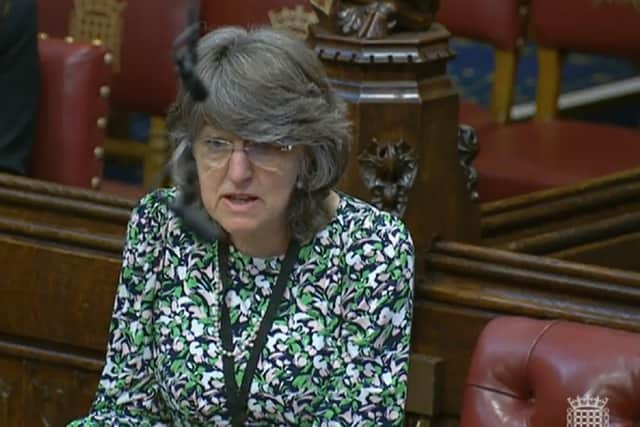Exclusive:Paedophiles who use the Metaverse to sexually assault children will soon move to real life, warns peer
and live on Freeview channel 276
Paedophiles are using the Metaverse to virtually sexually assault children - and there’s a danger this will push them closer towards “real life abuse”, a peer has warned.
The Metaverse is a shared virtual reality space, rolled out by Facebook and Instagram owner Meta, which allows users to interact with people all around the world. Users who join will create an ‘avatar’, which is essentially a virtual manifestation of themselves, and use this to experience the Metaverse - a place where people can often do things they wouldn’t be able to do in normal life.
Advertisement
Hide AdAdvertisement
Hide AdSome of these possibilities have great potential. The Metaverse can be used to train aspiring surgeons - as a space can be set up which allows people to practise keyhole surgery in a very life-like way before actually tackling the challenge in real life.
There are dangers too, however. Children are increasingly being drawn in by the Metaverse, and figures suggest that more than one fifth of five to 10-year-olds already have a virtual reality headset - or have asked for similar technology as a gift. But because the space is so new, one peer has pointed out that there aren’t yet adequate safeguards to protect children from possible adverse risks - such as sexual predators and abusers.
Raising the issue in the House of Lords during a debate on the government’s Online Safety Bill, Baroness Finlay explained: “Virtual reality devices can be linked to things such as wearable haptic suits, which allow the user to feel interactions through physical sensation”. This includes, she continued, “teledildonics” - which are devices used in spaces like the Metaverse to simulate sexual interaction.


One of the dangers that has arrived with the development of deep-fake imagery, which is used in the Metaverse, is that “it is now possible for an individual to order a virtual reality experience of abusing the image of a child whom they know,” Baroness Finlay warned.
Advertisement
Hide AdAdvertisement
Hide AdEssentially, paedophiles can use their avatar to sexually assault the avatar of a minor - and they can even personalise the minor’s avatar in whichever way they please. “These computer-generated images are so realistic that they are almost impossible to distinguish from those that would be cartoon-generated,” she explained.
“And since the intention of virtual reality is to trick the human nervous system into experiencing perceptual and bodily reactions, while such a virtual assault may not involve physical touching, the psychological, neurological, and emotional experience can be similar to a physical assault.”
What is even more concerning is that this fuels the addiction - and sexual predators want to move to real life assaults. “It is altering the offender pathway,” Baroness Finlay explained. “Once the offender has engaged with virtual reality abuse material, there is no desire to go back to 2D material. [Instead], offenders report that they want more. In the case of VR, that would be moving to real life abuse.”
Because this issue is new and still developing, there hasn’t yet been research into how quickly this happens. But Baroness Finlay told NationalWorld you can understand the “addiction pathway” by looking at things such as online gambling. People who become addicted to gambling online often start with only small bets. “That’s become a major problem,” she said. “It’s highly addictive, highly harmful, and has ruined people’s lives.”


Advertisement
Hide AdAdvertisement
Hide AdTo address these dangers, Baroness Finlay proposed an amendment to the government’s Online Safety Bill - which is hoping to make online spaces safer for children. Under her amendment, Ofcom would be able to suggest ways in which Parliament could update laws on child pornography to catch deep-fake imagery in virtual spaces such as the Metaverse.
“My Amendment 241 would require Ofcom to be alert to the ways in which emerging technologies allow for activities that are illegal in the real world to be carried out online, and to identify the places where the law is not keeping up to date with technological developments,” she explained in the House of Lords.
Expanding more on her suggestions, Baroness Finlay told NationalWorld: “The problem we’re faced with, in a nutshell, is that there are activities going on through the Metaverse which would be illegal in the offline world. Things are either illegal or they are not illegal. Things which are not legal cannot be allowed to be acted out in the virtual world.”
She pointed out that it’s worth noting the benefits of virtual reality - whether that be for “training surgeons in laparoscopic surgery” or “teaching pilots to fly”. But what must be done, Baroness Finlay continued, is look at the risks that come with this sort of technology - and find ways to “future proof” the Online Safety Bill against them.
Advertisement
Hide AdAdvertisement
Hide Ad“This is important because if the bill only deals with the problems of today, it will be out of date by tomorrow,” Baroness Finlay told NationalWorld. “Because this is moving so fast.”
A government spokesperson said: “The Online Safety Bill will capture all services where users can interact online, from websites to virtual reality apps on the Metaverse, and require them to use tough measures to prevent criminals from using their services to abuse children. If companies fail to tackle harmful material effectively, they will face huge fines.
“The government also announced today that we will be introducing new measures so that tech executives can face criminal charges if they fail to tackle child abuse on their service.”
Comment Guidelines
National World encourages reader discussion on our stories. User feedback, insights and back-and-forth exchanges add a rich layer of context to reporting. Please review our Community Guidelines before commenting.
